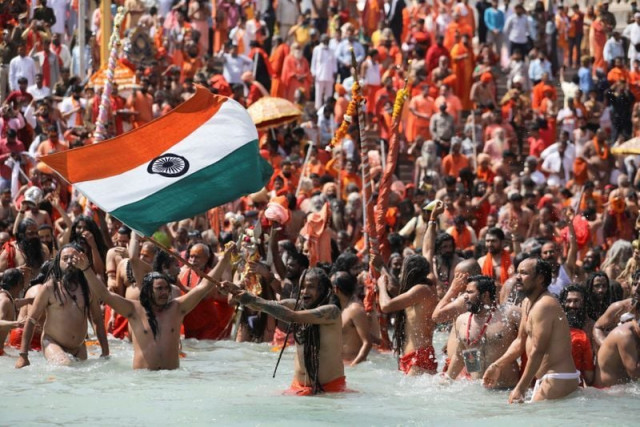India's Modi scorned over reckless rallies, religious gathering amid virus mayhem
Tags like #ResignModi and #SuperSpreaderModi have trended on Twitter in the past two days

Many Indians are pillorying Prime Minister Narendra Modi over his response to a scary surge in coronavirus cases, sickened by him addressing tens of thousands of people at state election rallies and letting Hindu devotees congregate for a festival.
Tags like #ResignModi and #SuperSpreaderModi have trended on Twitter in the past two days, as bodies piled up in mortuaries and crematoriums, and desperate cries for hospital beds, medical oxygen and coronavirus tests flooded social media.
Having swept to power in 2014 with the biggest single party majority in decades, Modi is unused to such public roasting.
Also read: India's Delhi to lock down for six days as COVID-19 outbreak worsens
He has diced with losing support before by springing unpopular reforms, notably after he decommissioned high denomination banknotes overnight in 2016, and last year, when his agricultural reforms provoked months of mass protests by angry farmers.But this is different.
The economy has struggled to recover following a months-long lockdown last year, yet for all the hardship suffered then, the second wave of the coronavirus epidemic is proving deadlier than the first.
India is currently recording more new cases of coronavirus than any other country, and this week it is expected to rise above the high tide of the epidemic seen in the United States, when daily new cases peaked at nearly 300,000 in early January.
Deaths in India have risen to nearly 179,000.
Yet Modi and his ministers have campaigned heavily ahead of state elections in West Bengal, where opinion polls showed the prime minister's Bharatiya Janata Party (BJP) was in a tight race with a regional party that rules the state.
"You hold rallies as people head to funerals," Akhilesh Jha, the data head of the federal Department of Science & Technology, wrote in Hindi on LinkedIn, in a rare public outburst by a government official.
"People will hold you accountable, you keep doing your rallies."
Several other government officials privately shared similar sentiments with Reuters.
The eight-phase voting in West Bengal ends on April 29.Whatever happens there, Modi doesn't have to worry about a national vote until 2024, but presently it is hard to say when India's coronavirus epidemic will subside.
A government spokesman did not respond to queries on criticism of Modi. But Piyush Goyal, the minister for railways, commerce and industry, told Reuters television partner ANI that Modi was working for many hours a day to manage the crisis.
On Saturday, Modi requested religious leaders to only symbolically celebrate a festival known as Kumbh Mela, after tens of thousands of Hindu devotees gathered daily in close proximity to immerse themselves in the Ganges.
But that was on the seventeenth day of the festival scheduled to run until the end of April, and it is yet to be officially called off despite authorities detecting hundreds of infections among participants who had poured in from across the country.
Though it isn't a force in the state, the main national opposition Congress party on Sunday called off election rallies in Bengal. But the BJP has insisted on its candidates "constitutional right" to campaign for at least 14 days.
Covid-19 cases in Bengal, meanwhile, have quadrupled since the start of April, and at least three election contestants have died.
"How many deaths does it take ‘til he knows, that too many people have died?” Nirupama Menon Rao, a former foreign secretary, asked on Twitter.



















COMMENTS
Comments are moderated and generally will be posted if they are on-topic and not abusive.
For more information, please see our Comments FAQ